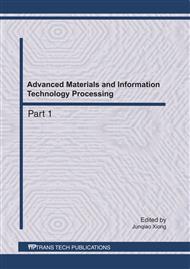[1]
Crafts, N. (2004) Steam as a general purpose technology: A growth accounting perspective,. The Economic Journal 114(2) 338 - 351.
DOI: 10.1111/j.1468-0297.2003.00200.x
Google Scholar
[2]
Ayres, R.U. and Warr, B. (2009) The Economic Growth Engine: How Energy and Work Drive Material Prosperity. Edward Elgar Publications. Cheltenham and Northampton, MA.
DOI: 10.15446/cuad.econ.v33n62.43680
Google Scholar
[3]
Nordhaus, W.D. (1980) Oil and economic performance in industrial countries., Brookings Papers on Economic Activity 2 341-99.
DOI: 10.2307/2534326
Google Scholar
[4]
Chakravorty, U., Roumasset, J., Tse, K. (1997) Endogenous substitution among energy resources and global warming. Journal of Political Economy 195, 1201-1234.
DOI: 10.1086/516390
Google Scholar
[5]
Berck, P. and M. Roberts (1996) Natural resource prices: will they ever turn up?, Journal of Environmental Economics and Management 31(1) 65–78.
DOI: 10.1006/jeem.1996.0032
Google Scholar
[6]
Fouquet, R. and P.J.G. Pearson (2003), Five Centuries of Energy Prices., World Economics 4(3) 93-119.
Google Scholar
[7]
Tahvonen, O., Salo, S. (2001). Economic growth and transitions between renewable and nonrenewable energy resources., European Economic Review 45: 1379-1398.
DOI: 10.1016/s0014-2921(00)00062-3
Google Scholar
[8]
Williams, D. (2003) Deforesting the Earth: From Prehistory to Global Crisis. University of Chicago Press. Chicago.
Google Scholar
[9]
Allen, R.C. (2003) Was there a timber crisis in Early Modern Europe, in Cavaciocchi, S. (ed. ) Economia e Energia. Le Monnier. Florence.
Google Scholar
[10]
Fouquet, R. (2008) Heat Power and Light: Revolutions in Energy Services. Edward Elgar Publications. Cheltenham and Northampton, MA.
Google Scholar
[11]
Warde, P. (2003) Forests, Energy, and Politics in the Early Modern German States, in Cavaciocchi, S. (ed. ) Economia e Energia. Le Monnier. Florence.
Google Scholar
[12]
Witthöft, H. (2003) Energy and Large Scale Industries (1300-1800), in Cavaciocchi, S. (ed. ) Economia e Energia. Le Monnier. Florence.
Google Scholar
[13]
Thomson, E. (2003) The Chinese Coal Industry: An Economic History. RoutledgeCurzon, London.
Google Scholar
[14]
Pommeranz, K. (2000) The Great Divergence: China, Europe and the Making of the Modern World Economy. Princeton University Press. Princeton, NJ.
DOI: 10.1017/s0395264900030195
Google Scholar
[15]
Fouquet, R. (2009) A brief history of energy, in J. Evans and L.C. Hunt (eds. ) International Handbook of the Economics of Energy. Edward Elgar Publications. Cheltenham, UK, and Northampton, MA, USA.
Google Scholar


